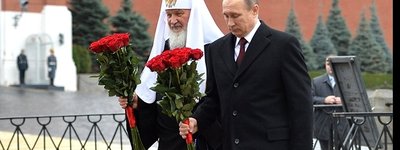A Conflict of Laws
The UOC’s practice of amending the charters of its organizations in accord with Russian rather than Ukrainian law casts a doubtful light on current statements about the supposed autonomy or even autocephaly of the UOC.
Experience teaches that recent indications of a change in the status of the Ukrainian Orthodox Church (UOC) vis a vis the Moscow Patriarchate should be viewed with skepticism. After all, the new provisions of the Russian Orthodox Church’s statute increase the UOC’s dependence on Moscow. At the same time, the UOC’s attempts to evade Ukrainian law on church and state only confirm the conclusion that religious liberty is being compromised.
Recent changes in Ukraine’s tax law have required corresponding amendments in the charters of religious organizations in order to maintain their status as tax-exempt organizations. Consequently, various parishes have prepared amended charters and sent them to the Ministry of Culture, which regulates religious matters, for confirmation. UOC parishes, however, have been submitting charters with amendments that, instead of conforming to the new tax laws, seek to enlarge the powers of their bishops and eparchies in violation of the Ukrainian Law on Freedom of Conscience and Religious Organizations.
On 22 November 2017, the Ukrainian Ministry of Culture issued a statement pointing out that the UOC’s charters not only fail to correspond to Ukrainian law, but reflect Russian law on church-state relations. In this way, they attempt to modify Ukrainian law in line with Russian law. By seeking to give the eparchy and its bishop new powers over the parishes and their property, they evidently wish to stem the tide of parishes leaving the UOC and joining the Ukrainian Orthodox Church of the Kyivan Patriarchate (UOC-KP). According to the Ministry’s statement, this attempt has been accompanied by refusal of the UOC to cooperate with the Ukrainian authorities, and by a massive media campaign of disinformation.
The Ministry’s statement provides a few examples of charters submitted by the UOC that seek to modify Ukrainian law instead of conforming to it. A proposed charter for an eparchial administration would make parishes dependent on the eparchy, which in turn depends on the religious center, whereas Ukrainian law maintains the independence of each parish organization (religious community). A proposed UOC eparchial charter would give the bishop the right to create and register parishes, whereas under Ukrainian law this right resides in the individuals who form the parish. In fact, the Ministry’s statement points out that such a charter violates article 35 of the Constitution of Ukraine, on freedom of religion. Moreover, such charters would, in the opinion of the Ministry of Culture, make the UOC a privileged church among Ukrainian religious organizations. Their registration would in effect import the Russian concept of church-state relations, with its eparchial controls over parish life and especially over property ownership, into Ukraine.
Some may question the general scheme of the Ukrainian Law on Freedom of Conscience and Religious Organizations, which in many ways remains a Soviet-era law. This law treats the religious community (parish) as the fundamental unit of religious activity, which is free to determine, and change, its higher spiritual and organizational allegiance. In Soviet times, this permitted the state and the Communist Party to control religious life through lay members of parish councils. But today, this scheme offers the individual believer, as well as the basic religious community, the freedom to choose its affiliation.
The Russian scheme, the Ministry statement points out, vests power in the eparchy, giving it control over all its parishes and their property. It is evident that in a situation where the UOC, successor to the Russian Orthodox Exarchate of Ukraine, controls a large number of eparchies, such an arrangement weighs in its favor. By contrast, the Ukrainian scheme offers individual parishes the option of switching their allegiance from UOC eparchies to eparchies of the UOC-KP or the Ukrainian Autocephalous Orthodox Church. One must agree with the statement of the Ministry of Culture that under current conditions, the latter scheme provides maximum religious freedom to the individual as well as to the religious association.
The UOC’s practice of amending the charters of its organizations in accord with Russian rather than Ukrainian law casts a doubtful light on current statements about the supposed autonomy or even autocephaly of the UOC. For regardless of its relations with its foreign center, a church that seeks to undermine the religious-liberty tenets of Ukraine’s laws in order to preserve its prerogatives must be regarded with the greatest caution.










